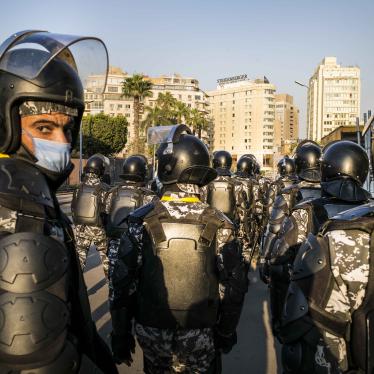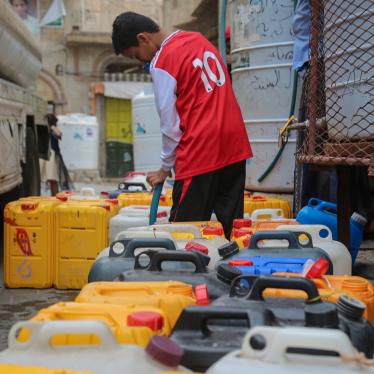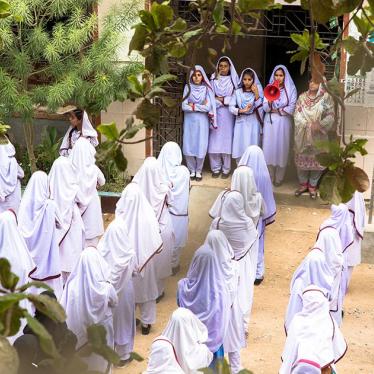(Beirut) – The Egyptian government heavily restricted civic space and public life and failed to ensure the economic rights of Egyptians throughout 2023, Human Rights Watch said today in its World Report 2024. The authorities drastically curtailed free expression and peaceful assembly in the lead up to the December presidential vote to stymie meaningful competition.
The relentless crackdown included new waves of politically motivated arrests and arbitrary detentions, intolerance of peaceful protests, and unfair trials of journalists and activists.
“In the face of political and economic challenges in 2023, the Egyptian government of Abdel Fattah al-Sisi resorted to its usual tactic of curtailing freedoms and detaining some people to intimidate other Egyptians, in order to discourage them from participating in public life or the political sphere,” said Amr Magdi, senior Middle East and North Africa researcher at Human Rights Watch. “No amount of repression can hide the fact that Sisi’s government has failed to protect if not actively worsened the economic, civil, political, and social rights of Egyptians.”
In the 740-page World Report 2024, its 34th edition, Human Rights Watch reviews human rights practices in more than 100 countries. In her introductory essay, Executive Director Tirana Hassan says that 2023 was a consequential year not only for human rights suppression and wartime atrocities but also for selective government outrage and transactional diplomacy that carried profound costs for the rights of those not in on the deal. But she says there were also signs of hope, showing the possibility of a different path, and calls on governments to consistently uphold their human rights obligations.
In November, the authorities referred Ahmed Tantawy, a prominent politician, along with his campaign director and 22 supporters, for trial on charges based merely on collecting political endorsements for his presidential campaign. The authorities successfully eliminated Tantawy as a possible challenger to Sisi by relying on repressive tactics. Between September and October, security forces detained over a hundred of Tantawy’s perceived or actual supporters, apparently solely in relation to their public support for him. Earlier in April and May, they also arrested some of his family members.
In August, annual inflation hit a new record of 39.7 percent, exacerbating Egyptians’ economic hardships. In September, a Bloomberg analysis showed that Egypt is the second most vulnerable country to a debt crisis after Ukraine. The government failed to take concrete measures to provide transparency and civilian oversight over the vastly expanding and opaque network of military-owned businesses or to protect economic rights, including by not sufficiently increasing social protection measures required under its loan agreement with the International Monetary Fund signed in late 2022.
In October, the authorities detained and prosecuted dozens of participants in pro-Palestine protests along with other activists in Cairo and Alexandria. Also in October, an appeals court confirmed a six-month prison sentence and a fine of EGP 20,000 (US$647) against prominent government critic and veteran publisher Hisham Kassem on politically motivated charges of libel, slander, and disturbing the authorities. In September, an appellate court upheld a four-year prison sentence for Mohamed Adel, a prominent activist and former leader of the April 6 Youth Movement, on charges of “spreading false news.”
In March, a Cairo Emergency State Security Court sentenced 29 rights activists charged with belonging to the Egyptian Coordination for Rights and Freedoms (ECRF), a human rights organization, to harsh prison terms between five years and life following an unfair mass trial.
The deadline for all nongovernmental groups to re-register under the draconian 2019 associations law passed in April. The law allows authorities to restrict and intervene in the work of independent groups, shut them down, or prosecute their staff members under a plethora of unlawful restrictions.
The authorities continued the systematic targeting of actual or perceived dissidents living abroad as well as their families inside Egypt. In August, the authorities detained the fathers of Ahmed Gamal Ziada, an Egyptian journalist living in Brussels who was previously detained and tortured in Egypt, and Fagr al-Adly, a German-Egyptian doctor and activist. Both fathers were released in October without trial.
The authorities have also refused to provide or renew the identity documents of dozens of dissidents, journalists, and human rights activists living abroad, apparently to pressure them to return to Egypt, where they would face near-certain persecution.








